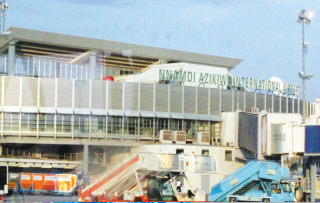Last week, Nigeria’s Minister of Aviation, Sirika Hadi, told journalists in Abuja that Nigeria will have a very strong, viable national airline before the end of 2017.
“When we came in we were very clear on our targets and goals and what we set out to achieve, and we did say that Nigeria does need a national airline,” Hadi said.
According to Hadi, the national carrier will be driven by the public and private sector partnership. Taking a clue from the Ethiopian airline, it has proven that the government is incapable of running a national carrier on its own.
“We are going to establish this national carrier and it will give good service. This is the solution because Nigeria has the market, we are 180 million, we are sitting in West Africa and in the West African market we are 450 million and Nigeria is the major player.”
This news comes at a time when Nigeria’s aviation industry is already experiencing a lot of problems. Looking at these problems, one would wonder if a national carrier is what Nigeria needs now. Not that Nigeria does not need a national airline, but there are more pressing issues facing the aviation sector that need to be sorted out first in order to have an efficient national airline.
Arik Airline, which can now win the award for the worst airline in Nigeria, was at a time the best airline in Nigeria. Hardly does a month go by without the airline trending for disappointing its passengers. Even the staff of the company are not contented working there but they are forced to stay glued because of the economic situation of the country. If these issues are not addressed before having a national carrier the fate of Arik air would befall Nigerians. The government also needs to take urgent steps on training Nigerians and expose them to flight experience. If this is not done immediately the country might not boast of citizens that can pilot a plane in the next 10 years. The government should work with the private sector to achieve all these instead of having a national carrier.
Here is a list of issues that are far more important than having a national airline
The facilities in the airport terminals
Most of the airport terminals in Nigeria have inadequate and poorly maintained cooling systems. Whenever the airport is jam-packed, you see people sweating. Passengers have collapsed on several occasions while waiting at the arrival or departure terminals. Most airports make use of standing fans instead of air conditioners and many of the toilets at the airports are in horrendous conditions.
Infrastructures at the airports
Nigeria has 26 airports, 22 are owned by the federal government and managed by the Federal Airports Authority of Nigeria (FAAN), which is actually a huge mark in the aviation sector because several African countries don’t have these number of airports. However, the major challenge in the sector is the lack of maintenance and no developmental policy to help improve the sector. Most of the airports lack the basic equipment and facilities such as passenger facilitation equipment like flight information display system, perimeter fencing, adequate fire cover and airfield lighting. It is worth noting that without airfield lighting, airplanes cannot land in an airport at night.
Security
It would be recalled that on Wednesday, 30th of November 2016, the lifeless body of a stowaway was found in the main wheel well of one of Arik Air’s A330-200 aircraft at the Oliver Tambo International Airport, Johannesburg, South Africa. This happened because the airport did not have security and perimeter fencing. This is typical of almost all the airports in Nigeria. There is also almost no good demarcation between arriving and departing passengers at most of the airports. The airports are also not well lighted in the night, which could also cause a security breach. Sometimes when there is power outage the airport remains dark until there is power supply because they do not have an effective power supply.
Technical knowhow
Currently, Nigerian airlines depend on expatriates as their engineers. The airlines pay so much to get these expatriates to work with them because their remuneration is three times higher than what they’ll pay their Nigerian counterparts. The foreign personnel are also paid in foreign exchange, which is not readily available in the country. These airlines are also not training their pilots because they cannot afford it.
According to reports, the Nigerian College of Aviation Technology (NCAT), Zaria, trains pilots, engineers and other technical personnel for the aviation industry but the pilot trained are not employed. This is because the pilots will need more exposure in flying in order to be type rated. In order words, the airlines prefer to go for expatriates.
Unfriendly government policies
Last year, about two international airlines (Iberia and United Airlines) exited the Nigerian aviation space due to the unfriendly environment for conducting business. They reportedly left Nigeria because they were unable to repatriate their revenue back to their countries as a result of a lack of foreign exchange.








